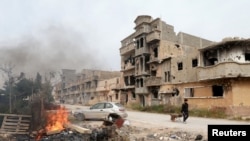By multiple accounts, Islamic State (IS) militants are getting stronger in Libya, where, according to U.S. intelligence, their ranks have doubled to about 6,500.
With Libyan politicians unable to form a unity government, some analysts say local militias are the best hope for stopping the radical Islamists, who recently secured a stronghold in the coastal city of Sirte.
“In Libya there are many such forces who oppose ISIS, but these forces and a coalition of convenience can be made, and the Libyan nation can be rebuilt by bringing together these main fighting forces to work together against ISIS," said Middle East researcher and analyst Jason Pack, using a common acronym for IS, which also goes by ISIL and Daesh.
Saying Libyan militias can act as the ground troops needed to retake IS-held territories, he also cautioned that such a coalition would first need training and weapons before it could launch a Western-airpower-backed attack on Sirte.
“The cleansing of Benghazi and Ajdabiya of Jihadist cells of both ISIS and Ansar al Sharia is a breakthrough, and the momentum of these gains needs to be carried forward and hopefully reach a new militia coalition that can launch an attack on Sirte,” Pack added.
Brookings Institution military expert Michael O’Hanlon also advocates a regional coalition approach, saying IS militants are already entrenched in Libya and therefore too strong for any one local group to face alone.
“Realistically we have to help certain Libyan groups that we believe we can work with to get stronger in certain parts of Libya, then pressure ISIS the ground, with U.S. pressure from the air,” he said.
Ambassador questions idea
But Ibrahim Al Dabashi, Libyan Ambassador to the UN, noted that such move could complicate the situation.
“I would like to warn against any attempt to bolster the capabilities of Libyan militias based on the assumption that, if equipped, they will fight ISIS in Sirte," he said, adding that these militias are the same ones that withdrew from battling IS in Sirte once before. "Such an attempt would [would only lead to] more complications of the Libyan crisis.”
President Barack Obama has backed the idea, saying “our strong preference, as has always been the case, is to train Libyans to fight."
"There’s a whole bunch of constituencies who are hardened fighters and don’t ascribe to ISIS or their perverted ideology," he said. "But they have to be organized and can’t be fighting each other.”
Martin Kobler, head of the U.N. Support Mission in Libya, warned last week that if IS militants continue to exploit Libya's political and security vacuum, they could expand to neighboring countries.
“It is very important to limit the expansion of the Islamic State because this adds to the already difficult situation; they are expanding to the East, to the West but also to the South,” Kobler told the U.N. Security Council, adding that the IS organization has bridgeheads in Niger and Chad. Should those IS militants team up with sympathizers in those neighboring countries, "it would be very difficult to redress.”
Intelligence officials say the organization’s immediate goal is to carve out a new caliphate in Libya.
The U.S. plans to defeat IS in Libya currently depend on persuading parliamentarians to end their divisions to create a government.
James Clapper, U.S. Director of National Intelligence, explained the crucial need for a unity government in Libya.
“We would like nothing better than to have a government in place in Libya whom we could work with and from whom we would gain consent for engaging militarily in Libya.”




